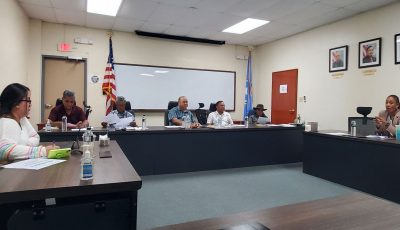IPI committed to following federal, local immigration and labor laws
Imperial Pacific International (CNM) LLC yesterday issued a statement reaffirming that they are committed to enforce and follow all federal and local immigration and labor laws. They also do not tolerate the practice of bringing in tourists who would work illegally on Saipan.
“Imperial Pacific unequivocally states that it does not endorse any engagement of illegal labor and immigration practices. It is a requirement and condition of employment that all employees of Imperial Pacific must comply with immigration laws and regulations,” IPI said in the statement.
IPI made the statement after majority of the more than 1,000 laborers working at IPI’s multi-million dollar Imperial Pacific Resort were found to have entered the CNMI as tourists.
MCC International, IPI’s subcontractor in building the casino hotel, was among the companies that allegedly hired Chinese workers who entered the Commonwealth using parole authority.
“Imperial Pacific is under strenuous obligations and will continue to enforce company policies and implement measures that comply and further strengthen its compliance with local and federal laws and regulations, especially those that governs and promotes legal labor and immigration practices.”
Kelly given info on NMI visa programs
United States Customs and Border Patrol Field Operations director Brian J. Humphrey said they have already explained to Department of Homeland Security Secretary John F. Kelly the United States visa programs that are implemented in the CNMI.
The China and Russian tourism markets hold a parole authority when traveling to the CNMI, while Japanese and Korean visitors enjoy the visa waiver program when they visit the Commonwealth. Foreign workers in the Commonwealth are under the CNMI-Only Transitional Nonimmigrant Worker visa program.
Informing the current DHS head is part of the protocol since he is part of the new administration of President Donald Trump. Trump has shown a tougher stance on border protection and immigration issues since being sworn in last January.
Improving immigration enforcement and border security is among the first executive orders that Trump had signed since taking office on Jan. 20. He signed the EO on Jan. 25.
Immigration issues became a hot button topic in the CNMI after incidents of overstaying tourists and others working illegally were uncovered recently.
Section 11 of Trump’s EO states that the executive department could cancel the parole and asylum provisions if found it is being abuse. Subsection A allows the DHS Secretary to immediately take action to make sure the parole and asylum provisions of Federal immigration laws are not illegally exploited.
“The final decision for the visa programs is up to [DHS] Secretary. He has the discretion to continue the [conditional] parole. And since we have a new administration, [Secretary Kelly] had asked information about the parole and what it means,” said Humphrey.
“We have provided him with the numbers and other information for him to weigh on his decision and on where he wants to go. Until then, we continue with the parole program and execute in on a case-by-case basis.”



























